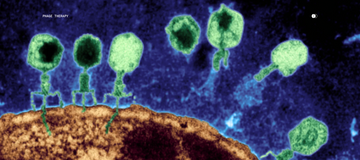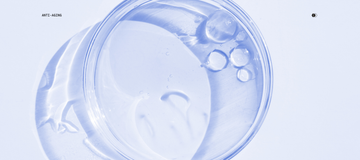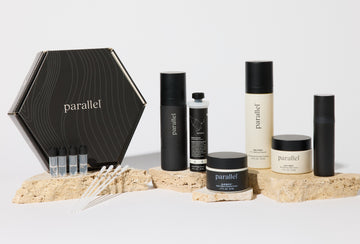The Complete Guide to Skin Microbiome Health: Understanding Your Skin's Hidden Ecosystem
by Parallel Health Team
What is the Skin Microbiome?
Your skin microbiome is a complex ecosystem of trillions of beneficial bacteria, fungi, viruses, and other microorganisms living on your skin's surface. This invisible community plays a crucial role in maintaining healthy skin, protecting against harmful pathogens, and supporting your skin's natural barrier function.
Unlike the gut microbiome, which has received significant attention in recent years, the skin microbiome remains largely misunderstood despite being equally important for overall health and wellness.
Why Your Skin Microbiome Matters
The Science Behind Skin Health
Research shows that a balanced skin microbiome is essential for:
- Barrier Protection: Beneficial bacteria create a protective shield against harmful microorganisms¹
- pH Balance: Maintaining optimal skin acidity levels (around 5.5 pH)
- Inflammation Control: Regulating immune responses and reducing chronic inflammation²
- Moisture Retention: Supporting the skin's natural hydration mechanisms
- Anti-Aging Benefits: Protecting against premature aging and environmental damage³
Common Skin Microbiome Imbalances
When your skin microbiome becomes disrupted, you may experience:
- Acne and breakouts
- Eczema and dermatitis
- Rosacea and inflammation
- Hidradenitis suppurativa
- Hyperpigmentation (and hypo-pigmentation)
- Face and scalp psoriasis
- Premature or accelerated aging
- Increased sensitivity
- Dryness or excessive oiliness
- Body odor and malodor
- Dandruff and scalp irritation
- Hair loss and thinning
Factors That Disrupt Your Skin Microbiome
Environmental Factors
- Over-cleansing: Using harsh soaps and cleansers strips beneficial bacteria
- Antibiotic Use: Both topical and oral antibiotics can eliminate good bacteria
- Pollution Exposure: Urban environments introduce harmful microorganisms
- UV Radiation: Sun damage affects microbial balance
- Climate Changes: Extreme temperatures and humidity levels
Lifestyle Factors
- Diet: High-sugar and processed foods promote harmful bacteria growth
- Stress: Chronic stress disrupts skin barrier function
- Sleep Deprivation: Poor sleep affects skin repair and microbial balance
- Product Overuse: Exfoliants, harsh actives, and strong preservatives can damage your microbial ecosystem
- Physical Manipulation: Tight hairstyles, frequent braiding, and excessive hair tension can damage follicles and disrupt scalp microbiome balance
How to Support a Healthy Skin Microbiome
Gentle Skincare Practices
Choose Microbiome-Friendly Products:
- Use gentle, pH-balanced cleansers (5.0-6.5 pH range)
- Select moisturizers with prebiotics and ceramides
- Incorporate probiotic skincare when appropriate that's right for your skin microbiome type
- Choose gentle, microbiome-supportive body washes and deodorants
- Use sulfate-free shampoos that preserve scalp microbiome balance
- Avoid antimicrobial products that disrupt beneficial bacteria
- Avoid products with harsh sulfates and alcohols
Simplify Your Routine:
- Limit your regimen to 3-4 of the best, most functional products
- Introduce new products gradually
- Focus on consistency over complexity
- Listen to your skin's responses
Advanced Microbiome Support
Phage Therapy: Emerging research shows that bacteriophages (phages) can selectively target harmful bacteria while preserving beneficial microorganisms⁴. This precision approach represents the future of microbiome-based skincare.
Personalized Solutions: Advanced skin microbiome testing using whole genome sequencing can identify your unique microbial composition, enabling targeted treatments for optimal skin health⁵.
The Future of Skin Microbiome Science
Precision Skincare Revolution
The skincare industry is experiencing a paradigm shift toward personalized, microbiome-based treatments. Key developments include:
- AI-Driven Analysis: Machine learning algorithms analyze individual microbiome profiles
- Custom Formulations: Targeted treatments based on specific bacterial imbalances
- Phage Technology: Selective elimination of pathogenic bacteria
- Biotech Innovation: Laboratory-grown beneficial bacteria for topical application
Clinical Applications
Medical research is revealing connections between skin microbiome health and:
- Autoimmune conditions
- Mental health (skin-brain axis)
- Systemic inflammation
- Accelerated aging processes
Frequently Asked Questions
Q: How long does it take to restore skin microbiome balance? A: Most people see improvements within 4-6 weeks of consistent microbiome-supporting skincare, though complete restoration may take 9-12 months for severe cases.
Q: Can I test my skin microbiome at home? A: Yes, advanced at-home testing kits using whole genome sequencing can provide comprehensive microbiome analysis and personalized recommendations.
Q: Can microbiome imbalances affect body odor and scalp health? A: Yes, disrupted microbiomes can lead to malodor-causing bacterial overgrowth, dandruff, and even contribute to hair loss by affecting scalp health and follicle function.
Q: Are probiotics in skincare effective? A: Topical probiotics can be beneficial, but the key is choosing the right strains for your specific skin type and concerns.
Q: What's the difference between prebiotics and probiotics for skin? A: Prebiotics feed beneficial bacteria already on your skin, while probiotics introduce new beneficial microorganisms.
Taking Action for Better Skin Health
Understanding your skin microbiome is the first step toward achieving optimal skin health. Consider these immediate actions:
- Assess your current routine for potentially disruptive products
- Introduce microbiome-friendly alternatives gradually
- Consider professional testing to understand your unique microbial profile
- Focus on consistency rather than trying multiple new products simultaneously
Your skin microbiome is as unique as your fingerprint. By supporting this invisible ecosystem, you're investing in long-term skin health, resilience, and natural radiance.
Ready to discover your skin's hidden ecosystem? Explore advanced microbiome testing and personalized skincare solutions designed for your unique microbial profile.
References
-
Grice EA, Segre JA. The skin microbiome. Nat Rev Microbiol. 2011;9(4):244–53.
-
Rinnerthaler M, Bischof J, Streubel MK, Trost A, Richter K. Oxidative stress in aging human skin. Biomolecules. 2015;5(2):545–589.
-
Xiong ZM, O'Donovan M, Sun L, et al. Anti-Aging Potentials of Methylene Blue for Human Skin Longevity. Sci Rep. 2017;7:2475.
-
Marinelli LJ, Fitz-Gibbon S, Hayes C, et al. Propionibacterium acnes bacteriophages display limited genetic diversity and broad killing activity against bacterial skin isolates. mBio. 2012;3(5):e00279-12.
-
Mun S, Jo H, Heo YM, et al. Skin microbiome-biophysical association: a first integrative approach to classifying Korean skin types and aging groups. Front Cell Infect Microbiol. 2025;15:1561590.
- acne ,
- alopecia ,
- anti-aging ,
- body odor ,
- deodorant ,
- discoloration ,
- eczema ,
- hair loss ,
- hidradenitis suppurativa ,
- hormonal acne ,
- hyperpigmentation ,
- mega-menu ,
- microbial analysis ,
- microbiome-friendly ,
- odor microbiome ,
- personalized health ,
- phage therapy for body odor ,
- phage therapy for skin ,
- postbiotics ,
- prebiotics ,
- probiotics ,
- psoriasis ,
- skin longevity ,
- skin microbiome ,
- skin microbiome skincare ,
- skin microbiome testing ,
- skin testing ,
- skincare ,
- skincare for acne



























